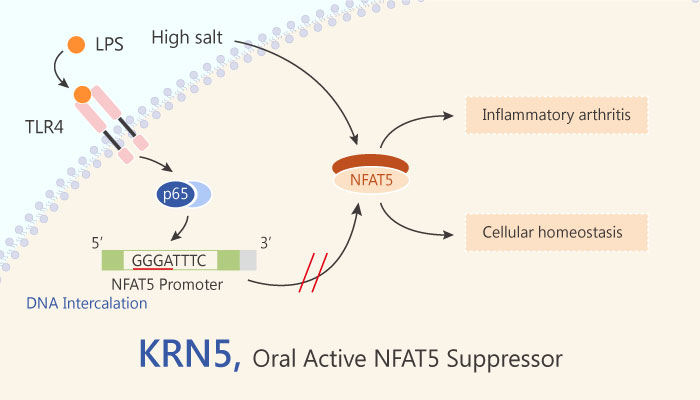Nuclear factor of activated T cells 5 (NFAT5) participates in the pathogenesis of various human diseases, including cancer and arthritis. However, there are no therapeutic drugs that inhibit the activity of NFAT5 currently. A study from Eun-Jin Han, et al. discovered and verified NFAT5 inhibitors, which filled up the gap.
Firstly, the authors screened a library with more than 40000 chemicals for the suppression of nitric oxide, which direct targets NFAT5. Through high-throughput screening, they validated and identified the novel NFAT5 suppressor KRN2, and its derivative KRN5.
KRN5 exhibits high oral bioavailability and metabolic stability.
Then they carried out a series experiments both in vitro and in vivo to determine the effect of KRN5.
In vitro, KRN5 is a Nuclear factor of activated T cells 5 (NFAT5) suppressor, with an IC50of 750 nM. Moreover, KRN5 is less toxic than BBR as determined by a cytotoxicity assay, cytochrome inhibition assay, and other tests. KRN5 at a concentration of 1 μM inhibited the expressions of NFAT5, IL-6, MCP-1, and GM-CSF, which are NFAT5 target molecules, in RAW264.7 macrophages stimulated with LPS.
In vivo, oral feeding treatment of KRN5 (every other day, 3 weeks from day 21) dose-dependently mitigated arthritis severity. Moreover, KRN5 treatment at 60mg/kg showed more potent in suppressing arthritis than Methotrexate. By the way, Methotrexate is a common used disease-modifying anti-rheumatic drug (DMARD). Importantly, there were no side effects noted throughout the experiments. Obviously, KRN5 significantly decreased the concentration of serum anti-type II collagen IgG in mice. In parallel, compared to vehicle-treated CIA mice, KRN5 treatment significantly down-regulated TNF-α and IL-6 production produced by LPS-stimulated splenocytes. It also reduced NFAT5 expression in spleen cells stimulated by LPS.
All in all, KRN5 has potential to treat NFAT5-mediated Chronic Arthritis.
